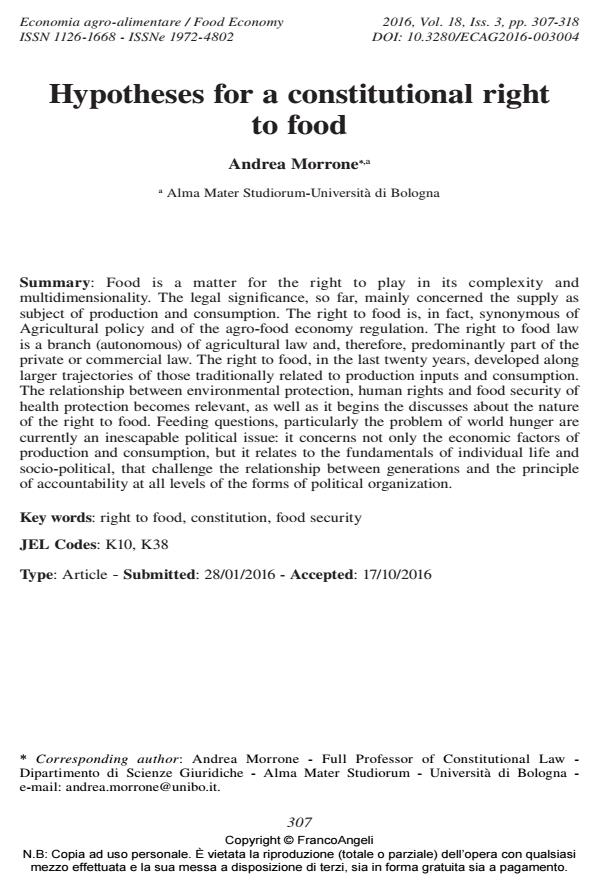Hypotheses for a constitutional right to food
Journal title ECONOMIA AGRO-ALIMENTARE
Author/s Andrea Morrone
Publishing Year 2017 Issue 2016/3
Language English Pages 12 P. 307-318 File size 98 KB
DOI 10.3280/ECAG2016-003004
DOI is like a bar code for intellectual property: to have more infomation
click here
Below, you can see the article first page
If you want to buy this article in PDF format, you can do it, following the instructions to buy download credits

FrancoAngeli is member of Publishers International Linking Association, Inc (PILA), a not-for-profit association which run the CrossRef service enabling links to and from online scholarly content.
Food is a matter for the right to play in its complexity and multidimensionality. The legal significance, so far, mainly concerned the supply as subject of production and consumption. The right to food is, in fact, synonymous of Agricultural policy and of the agro-food economy regulation. The right to food law is a branch (autonomous) of agricultural law and, therefore, predominantly part of the private or commercial law. The right to food, in the last twenty years, developed along larger trajectories of those traditionally related to production inputs and consumption. The relationship between environmental protection, human rights and food security of health protection becomes relevant, as well as it begins the discusses about the nature of the right to food. Feeding questions, particularly the problem of world hunger are currently an inescapable political issue: it concerns not only the economic factors of production and consumption, but it relates to the fundamentals of individual life and socio-political, that challenge the relationship between generations and the principle of accountability at all levels of the forms of political organization.
Keywords: Right to food, constitution, food security
Jel codes: K10, K38
- Alighieri, D. (2005). Convivio (1304-1307). Milano: Garzanti.
- Altili, P. (2010). I prodotti agroalimentari tradizionali come beni culturali. Economia della cultura, 17(1), 35-46. DOI: 10.1446/32183
- Bottari, C. (2015). La sicurezza alimentare. Profili normativi e giurisprudenziali tra diritto interno, internazionale ed europeo. Rimini: Maggioli.
- Bottoni, R. (2013). Le discriminazioni religiose nel settore lavorativo in materia di alimentazione. Quaderni di diritto e politica ecclesiastica, 16(1), 105-141. DOI: 10.1440/73466
- Brillat-Savarin, A. (1998). Physiologie du gout (1826). Palermo: Sellerio editore.
- Canetti, E. (1972). Masse und Macht (1960). Milano: Rizzoli.
- Cicerchia, A. (2010). Cultura, Cibo e Paesaggio: lo sguardo economico. Economia della cultura, 17(1), 5-14. DOI: 10.1446/32181
- Comitato nazionale di Bioetica, Alimentazione differenziata e bioetica, 17 marzo 2006.
- Costato, L. (2011). Dalla food security alla food insecurity. Rivista di Diritto Agrario, 11(1), 3-16.
- De Castro, P. (2012). Corsa alla terra. Cibo e agricoltura nell’era della nuova scarsita, II ed. Roma: Donzelli.
- Desmarais, A.A. (2009). Via Campesina. La globalizzazione e il potere dei contadini. Milano: Jaca book.
- Ferrari, M., Izzo, U. (2012). Diritto alimentare comparato. Bologna: Il Mulino.
- Gadbin, D. (2011). Droit de l’alimentation et droit agricole européens: quelles articulation? Rivista di Diritto Agrario, 11(3), 351-373.
- Golay, C. (2011). Droit a l’alimentation et acces a la justice. Bruxelles: Bruylant.
- Habermas, J & Taylor, C. (2003). Multiculturalismo. Milano: Feltrinelli.
- Marx, K. (2012). Lineamenti fondamentali di critica all’economia politica. Grundrisse. Roma: Manifestolibri.
- Montanari, M. (2004). Cibo e cultura. Bari: Laterza.
- Paoloni, L. (2011). I nuovi percorsi della food security: dal “diritto al cibo adeguato” alla sovranità alimentare. Diritto e giurisprudenza agraria, alimentare e ambientale, 11(3), 159-165.
- Pelluchon, C. (2015). Les Nourritures. Philosophie du corps politique. Paris: Seuil.
- Poddighe, E. (2015). Obesita e diritto. Uno studio sul “paternalismo alimentare”. Bologna: Il Mulino.
- Predieri, A. (1981). Paesaggio, in Enc. Dir., Vol. XXXI. Milano: Giuffrè.
- Reppoport, L. (2003). Come mangiamo: appetito, cultura e psicologia del cibo. Milano: Ponte alle Grazie.
- Rinella, A. & Okoronko, H. (2015). Sovranità alimentare e diritto al cibo. Diritto pubblico comparato ed europeo, 17(1), 89-130. DOI: 10.17394/79525
- Rinella, A. & Pingitore, C. (2015). Organismi geneticamente modificati. Profili di diritto comparato ed europeo. Bologna: FiloDiritto.
- Segré, A. (2011). Politiche per lo sviluppo agricolo e la sicurezza alimentare. Roma: Carocci.
- Tannahill, R. (1987). Food in History (1973-1975). Milano: Rizzoli.
- Teubner, G. (2012). Nuovi conflitti costituzionali. Milano: Garzanti.
- Ziegler, J. (2011). Destruction massive. Paris: Seuil.
Andrea Morrone, Hypotheses for a constitutional right to food in "ECONOMIA AGRO-ALIMENTARE" 3/2016, pp 307-318, DOI: 10.3280/ECAG2016-003004